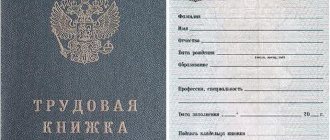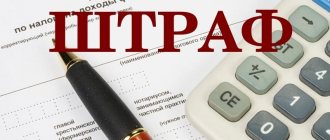Types of checks
There are inspections: scheduled and unscheduled. You can learn about scheduled inspections before the start of the year on the website of the Prosecutor General’s Office. To prepare for such a check, Rostrud has made checklists that can be filled out online. That is, you take a test and at the end they give you something like a verification report. There will be warnings and tips on what is important to fix before checking. The wording in the tests is not the simplest, but the idea of this tool itself is good and can be useful.
The good news is that small businesses are exempt from inspections until the end of 2020. True, there are exceptions here - small businesses in the field of education, healthcare, social sphere and with licensed types of activities can still be checked.
But no one is immune from unscheduled inspections; I’ll tell you about their reasons below.
Scheduled and unscheduled inspections are on-site and documentary:
Documentary is when you are asked to send certified copies of documents to eliminate suspicions of violations that inspectors now have. For example, they see that you pay a very small salary and ask you to explain. And you say that your salary is this way because your employees work part-time and send certified copies of employment contracts as confirmation.
On-site inspections are when inspectors come to your office, store or salon personally and unexpectedly. They will also look at documents, and for any period, but only on the topic of verification. Read it in advance in the inspection order. For example, if the topic of the audit is the calculation and payment of wages, then inspectors do not have the right to check issues related to the personal data of employees. And an order that does not indicate the subject of inspection at all is illegal.
Occupational Safety and Health
If we talk about what the labor inspectorate fines for, first of all, according to statistics, we can highlight the failure of organizations to provide normal working conditions for employees. Violation of labor safety standards is a fairly common practice among legal entities and entrepreneurs.
Some facts
The salary amounts established in employment contracts and in the staffing table are necessarily reviewed during the audit. They also look at whether changes to labor relations related to changes in employee wages have been made correctly. The expression “with payment according to the staffing table” is not allowed in an employment contract! According to Article 57 of the Labor Code of the Russian Federation, it is necessary to indicate in the employment contract: the amount of the tariff rate or official salary, bonuses and additional payments. It is necessary that the information in the employment contract, staffing table, Internal Labor Regulations, Regulations on remuneration and bonuses, acts of absence of workers for wages, payment documents and notifications for dismissed persons, pay slips and orders is the same.
A planned inspection of an enterprise by the labor inspectorate occurs once every few years, but an unscheduled inspection can also be carried out if the authority receives a complaint from an employee against a legal entity. Based on the results of the inspection, the inspector concludes whether all the requirements of the Labor Code of the Russian Federation are observed by the employer, the director of the organization and authorized responsible persons.
In 2020, mitigating measures were provided for legal entities, which mean that the enterprise and authorized persons will not be fined upon detection of the first minor non-compliance with the Labor Code. The inspector will point out violations and give the legal entity a certain period of time to correct them. After the specified time has expired (approximately a month), the organization will be visited again by an authorized commission from the labor inspectorate with a second inspection.
If the necessary measures are taken and all violations are corrected, the legal entity will be able to avoid a fine from the labor inspectorate. For failure to comply with the instructions of an authorized person within the specified time frame, a fine in the amount of 300 to 500 thousand rubles is imposed on legal entities, and for an authorized official the fine ranges from 16 to 20 thousand rubles.
Let's consider what administrative measures are used to punish various violations of labor protection requirements and how much labor inspectorate fines are for legal entities in 2020.
- The absence in the organization of an authorized person responsible for labor protection and conducting training for employees is an administrative fine in the amount of 50 to 80 thousand rubles.
- Lack of documents confirming the completion of introductory and ongoing safety briefings by all employees of the enterprise - a fine in the amount of 110 to 130 thousand rubles.
- Lack of documents, manuals and recommendations on labor protection, including safety recommendations when working at a designated enterprise - a fine of up to 80 thousand rubles.
- Failure to conduct a special assessment of working conditions - a fine of 80 thousand rubles.
- Failure to ensure that employees undergo a routine medical examination, if the need for examination is provided for by the Labor Code of the Russian Federation - a fine of up to 130 thousand rubles.
- Failure to provide employees with special clothing, if the Labor Code of the Russian Federation states that this group of employees must be provided with special clothing - a fine of 130 to 150 thousand rubles.
Typically, the labor inspectorate issues an administrative fine and an order for the company, although the inspector has the right under the criminal code to issue a fine to the employer if a violation is confirmed. For minor violations, the inspector will first suggest fulfilling the order, and only when the recommendations are not followed will he impose a fine.
If legal entities are repeatedly involved in an administrative violation, the fine may be increased to 200 thousand rubles. As an alternative to a fine, suspension of the production process for up to 90 calendar days can be practiced.
Fines for violating labor laws are discussed in the video
Reasons for inspections
The most common complaint is from your own employees. More calls can come from the prosecutor's office, police, tax office, foundations, and even from job sites. For example, when one of the conditions of employment is Moscow registration.
According to the labor inspectorate portal, more than half of the complaints relate specifically to wages. That is, workers are ready to tolerate violations of their labor rights and make compromises with the employer as long as money is not involved.
However, the labor inspectorate does not accept anonymous applications. You need to come with a complaint in person or leave it on the website by registering through the government services portal.
Interesting fact 1: not only the employee whose rights are violated can complain about you, but also his colleague.
Interesting fact 2: you should not be told the name of the employee who complained about you, nor should you be shown the text of his complaint.
Lead employees in Elba
The service will calculate taxes and prepare all necessary reporting for employees. And you don’t have to understand the legislation and fill out the forms yourself.
Try 30 days free Gift for new entrepreneurs The promotion is valid for individual entrepreneurs under 3 months old
The labor inspectorate is on the doorstep - let’s put things in order in personnel records.
And not into your own pocket, as one might think, but into contributions to the state. Such withdrawals include 13% of earnings (personal income tax) and various types of deductions based on issued executive documents.
These include:
- writs of execution;
- Court order;
- Court act;
- Resolution of the bailiff;
- Order on payment of alimony;
- Resolution on payment of a fine, compensation for damage.
What is the maximum amount that can be deducted for these documents? Let us turn to Article 138 of the Labor Code of the Russian Federation:
The total amount of all deductions for each payment of wages cannot exceed 20 percent, and in cases provided for by federal laws, 50 percent of wages due to the employee.
When deducting from wages under several executive documents, the employee must, in any case, retain 50 percent of the wages.
The restrictions established by this article do not apply to deductions from wages when serving correctional labor, collection of alimony for minor children, compensation for harm caused to the health of another person, compensation for harm to persons who suffered damage due to the death of the breadwinner, and compensation for damage caused by a crime. . The amount of deductions from wages in these cases cannot exceed 70 percent.
Errors that lead to checks
An employer may be punished if he:
- does not pay wages on time, once a month is also not on time;
- does not pay wages in full or is, in principle, less than the minimum wage;
- delays payment upon dismissal;
- does not pay overtime;
- pays vacation pay later than 3 days before the start of the vacation;
- does not allow vacation;
- does not conduct a special assessment of working conditions;
- does not issue a pay slip that describes how the employee’s salary is calculated;
- makes mistakes in employment contracts.
I’ll write a few words separately about errors in employment contracts. The very first tactical mistake is replacing the employment contract with a GPC agreement. Do not do it this way. Yes, under a GPC agreement you can pay slightly less insurance premiums for an employee, but this 4-5% does not help you save much, and puts you at risk.
Which contract to choose: labor contract or GPC
And then there are factual errors in the text of the contract itself. For example, clear dates for salary payment are changed to the abstract “Salary payment until such and such a date.” Or they do not indicate the employee’s job function - it is important to list his main responsibilities in the employment contract or refer to the job description. Otherwise, how can an employee feel confident that you will not force him to do things that are not required by his position?
For example, Russian Post was fined 2 million rubles for forcing its employees to sell products, although such an obligation is not provided for in their employment contract.
Punishment under the Criminal Code
Business managers should be aware that they may be punished not only under administrative penalties, but also under the Criminal Code if their safety violations are too serious.
The corpus delicti in this case is determined by Article 143 of the Criminal Code of the Russian Federation:
- A fine of 400,000 rubles or imprisonment - such a penalty is provided for a manager if his actions caused harm to the employee’s health.
- Also, when a manager receives a fine, he is deprived of the opportunity to hold his position for a certain period of time.
- Compulsory work or a fine of 200,000 rubles awaits the head of an enterprise if he fires a pregnant employee or a mother with a child under 3 years old.
- The same penalty is provided in the event that the manager refuses to accept the position without reason.
- Imprisonment, forced labor, and a fine of up to 120,000 rubles are punishments for those managers who refuse to pay the required wages, advance payments, vacation pay, and other payments.
There is an assumption that the Ministry of Labor will begin to fine companies without inspections. Management must comply with safety regulations and provide their employees with normal working conditions, regardless of whether inspections are carried out at the enterprise or not.
Fines for mistakes
Maybe you'll get lucky and the inspectors will get away with a warning. If you are unlucky, you will face a fine for an administrative violation.
They did not conclude an employment contract and replaced it with GPC (Part 4 of Article 5.27 of the Code of Administrative Offenses of the Russian Federation):
- for officials - in the amount of 10,000 to 20,000 rubles;
- for entrepreneurs - from 5,000 to 10,000 rubles;
- for organizations - from 50,000 to 100,000 rubles.
Non-payment of wages or incomplete payment (Part 6 of Article 5.27 of the Code of Administrative Offenses of the Russian Federation):
- for officials - a warning or an administrative fine in the amount of 10,000 to 20,000 rubles;
- for entrepreneurs - from 1,000 to 5,000 rubles;
- for organizations - from 30,000 to 50,000 rubles.
Minimum and maximum fines
Violations of labor laws can involve a variety of actions by employers. The size of the applied sanction directly depends on the nature of such actions, as well as on the severity of the resulting consequences, for example:
- The director of the organization allows an employee to work who, for one reason or another, has not passed the mandatory medical examination. This violation is truly serious, because if an employee has health problems, fulfilling professional obligations can result in huge troubles. In this case, the amount of the penalty for a legal entity can reach 130,000 rubles.
- The head of the organization tries by any means to avoid concluding a formal employment contract with a new employee. In accordance with the current rules, such a document must be signed by the parties within 3 days after the new employee begins to fulfill his professional obligations. If the manager does not want to fulfill these obligations, the employee will be able to contact the labor inspectorate. The fine in this case can reach 120,000 rubles. This category also includes situations in which an employer enters into a civil law agreement with an employee without legal grounds for this.
The above amounts of penalties are established for violations that were officially recorded by the employer for the first time. If they are repeated, the amount of penalties increases significantly.
Paid services of scammers
Remember, any inspection begins with the inspector’s identification and an inspection order, which must be signed and sealed by the head of the territorial body. Don’t even let them near your documents without them.
Fraudsters know how to play on the feelings of entrepreneurs - they introduce themselves as employees of the labor inspectorate, scare them with an upcoming unscheduled inspection and offer to help them prepare for it. For money, of course. Remember: no government departments provide paid services.
Carrying out inspections
Employers are subject to inspection by the State Labor Inspectorate (SIT), which consists of the following stages:
- notification of the inspected person about the upcoming scheduled on-site inspection. At least three days before the relevant date, the employer is notified of the arrival of the GIT inspector. If an organization or individual entrepreneur is inspected unscheduled, this period is reduced to one day. The person being inspected may request information about the official conducting the inspection, as well as become familiar with the control measures that will be carried out in the future in relation to the organization or individual entrepreneur,
- initiating a State Tax Inspectorate inspection at the location of the person being inspected. As a rule, inspections begin with studying the documentation of an organization or individual entrepreneur, but it happens that the inspector can immediately visit the place of the person being inspected. When appearing, the official shows a certificate and an order to conduct an inspection, a copy of which the entrepreneur should have already seen earlier along with the notification. If one official is listed in the order, but in fact another inspector appears for the inspection, then such an inspection will be considered illegal. After the completion of control activities, the State Tax Inspectorate draws up two acts for each party. However, this procedure more often takes place on the territory of the authorized body, where the head of the organization or individual entrepreneur is invited in advance.
If violations are detected, the GIT inspector issues an order stating the following:
- violation, date and time of its commission,
- reference to a normative legal act,
- deadline for eliminating violations. For failure to comply with the order of the GIT inspector, the organization or individual entrepreneur is liable in accordance with the Code of Administrative Offenses of the Russian Federation.
Attention! Our qualified lawyers will assist you free of charge and around the clock on any issues. Find out more here.
What does the labor inspectorate control?
Labor inspectors control:
- Compliance by employers with labor laws.
- Compliance with the procedure for investigating and recording industrial accidents.
- Implementation of the rights of workers to receive provision for compulsory social insurance against accidents at work and occupational diseases.
- Assignment, calculation and payment of temporary disability benefits at the expense of employers.
The labor inspectorate can inspect any company or entrepreneur. First of all, those who “did not find a common language” with their own employees.
The prosecutor's office, police, and tax authorities actively cooperate with the labor inspectorate. Joint audits are even carried out with the tax office.
Sometimes the inspector learns the necessary information from the media and advertising publications. For example, there are often advertisements seeking employees with violations of the Labor Code on discrimination in hiring.
note
Having learned about violations from advertising, the press, anonymous messages, etc., labor inspectors can include the company in the inspection plan. Trudoviks have no right to conduct unscheduled inspections based on such data (Part 3 of Article 10 of Federal Law No. 294-FZ of December 26, 2008).









